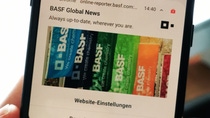Media
Ultrason® P for bottles: tailor-made for all relevant processing methods
- With the BASF polyphenylsulphone (PPSU) portfolio, bottles can be manufactured by injection stretch blow molding, extrusion blow molding and injection molding
- For safe and robust bottles in numerous designs, shapes and colors
- Bottles showcased on BASF booth at CHINAPLAS 2021
BASF has now expanded its Ultrason® P portfolio so that it can be used to manufacture high-quality bottles by all three processing methods that are standard in the industry. The two polyphenylsulphone (PPSU) grades Ultrason® P 2010 and P 3010 can be used in injection stretch blow molding, extrusion blow molding and injection molding to manufacture bottles for adults and babies that are safe to use, robust and chemically resistant as well as available in numerous designs, shapes and colors. All three processing methods benefit from the customized properties of the high-temperature thermoplastic: It contains no harmful substances, is approved for food contact and has outstanding strength, chemical resistance and long-term high-temperature stability up to 180°C. Bottles made from the transparent, slightly honey-colored BASF polyphenylsulphone can easily withstand sterilization in a microwave or in very hot water – regardless of the method used to manufacture them.
“The production of high-quality, safe and stylish bottles for adults and babies presents a challenge that cannot be compared to that of conventional PET, PP or co-polyester bottles,” says Georg Grässel from BASF’s global business development Ultrason®. “The globally widespread processing methods all have their own specific requirements of the material used – and this is where Ultrason® P has proven its value to customers in many different countries. They can choose the most suitable material from our portfolio and can also benefit from our on-site technical application support and the global availability of the different grades.”
During extrusion blow molding, the plastic melt is extruded from top to bottom through a circular die to form a tube-shaped parison. Internal pressure is then used to inflate the parison within a mold thus giving the part its shape. The medium-viscosity Ultrason® P 3010 is particularly suitable for this process due to its inherent high melt strength in contrast to other PPSU materials on the market. This allows the hot, elongated parison to remain stable even near the die, ensuring uniform blow molding. For complex geometries with different wall thicknesses and designs, a programmed parison control can be used. This prevents elongation of the parison caused by the parison’s weight and results in uniform wall thicknesses over the complete length of the bottle.
When injection molding is used, the bottle body can be injection molded with or without a cap thread and base, which provides great flexibility when it comes to the bottle design or the method used to vent baby bottles. Today, the manufacturing with single and multi-cavity molds in combination with an upstream hot runner system is state of the art. The high-flow, low-viscosity Ultrason® P 2010 is particularly well suited for this, as it makes thin walls possible even when there are long flow paths – without compromising the impact or chemical resistance.
The most widespread manufacturing process of all, especially for baby bottles in Asia, is injection stretch blow molding. First a parison looking like a test tube with cap thread is produced in an injection mold, then re-heated and finally stretched and inflated in a blow mold that models the bottle design as a negative. The advantages of Ultrason® P 3010 can be primarily found in the rapid cycle times and exact molding of the bottle cap thread.
Both Ultrason® P grades are suitable for injection molding and injection stretch blow molding because they are particularly easy to process using suitably configured hot runner systems without scrap losses. This makes it possible to produce bottles with Ultrason®P that can be used for a long time and in many different application areas without compromising the quality of the mechanical and optical properties.
Ultrason® is the trade name for BASF’s product range of polyethersulfone (Ultrason® E), polysulfone (Ultrason® S) and polyphenylsulfone (Ultrason® P). The high-performance material is used to manufacture lightweight components in the electronics, automotive and aerospace industries as well as in water filtration membranes and in parts that come into contact with hot water and food. Because of their extraordinary property profile the Ultrason® brands can substitute thermosets, metals and ceramics in many applications.
For more information: www.ultrason.basf.com
About BASF’s Performance Materials division
BASF’s Performance Materials division encompasses the entire materials’ know-how of BASF regarding innovative, customized plastics under one roof. Globally active in four major industry sectors – transportation, construction, industrial applications and consumer goods – the division has a strong portfolio of products and services combined with deep understanding of application-oriented system solutions. Key drivers of profitability and growth are our close collaboration with customers and a clear focus on solutions. Strong capabilities in R&D provide the basis to develop innovative products and applications. In 2020, the Performance Materials division achieved global sales of €5.63 billion. More information online: www.plastics.basf.com.
About BASF
About BASF At BASF, we create chemistry for a sustainable future. We combine economic success with environmental protection and social responsibility. More than 110,000 employees in the BASF Group contribute to the success of our customers in nearly all sectors and almost every country in the world. Our portfolio is organized into six segments: Chemicals, Materials, Industrial Solutions, Surface Technologies, Nutrition & Care and Agricultural Solutions. BASF generated sales of €59 billion in 2020. BASF shares are traded on the stock exchange in Frankfurt (BAS) and as American Depositary Receipts (BASFY) in the U.S. Further information at www.basf.com.
P-21-156


